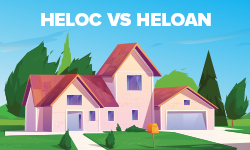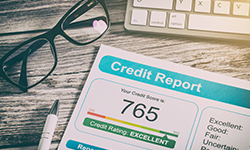Home Equity Line of Credit (HELOC)
With a Home Equity Line of Credit or HELOC you can use the equity in your home to help pay for large or unexpected expenses like home improvements, travel, or medical bills.
How it Works:
1. Build Equity In Your Home
Home equity is the amount
of your home that you own
(free and clear of financing),
and it grows over time
when you make payments
on your mortgage.
2. Determine Your Equity
Your home's equity is the
portion of your home that you
own, calculated by subtracting
the balance of your mortgage
from your home's market value.
3. Let Your Home's Equity Work For You
With a HELOC you can use your
Home's Equity to help make home
improvements and pay for
other large expenses.
FREQUENTLY ASKED QUESTIONS (FAQ)
A Home Equity Line of Credit or HELOC is revolving credit that lets you tap into the equity of your home to borrow money. Like a credit card, you choose how much of the credit line you'd like to use and make payments on the amount that you borrow.
There are several benefits to Home Equity Line of Credit (HELOC). For example:
- A HELOC, typically has lower interest rates than other loans or other forms of credit (like credit cards or personal loans) because your home is used as collateral — meaning the risk to the lender is less than with an unsecured loan. Also, a lower interest rate means that you'll be paying less in interest over time.
- Depending on how much equity you have in your home, a HELOC can allow you to borrow large sums of money.
- A HELOC gives you flexibility because unlike a loan, which requires borrowing the entire amount in one lump sum, a Home Equity Line of Credit lets you use only as much credit as you need.
- You can use a HELOC for any purpose you choose. Finance home improvements, pay hefty medical bills, help pay educational costs, and more.
- If you use your HELOC for substantial home improvements to add to your home's value, you may be able to deduct some or all of the interest on the HELOC at tax time if you itemize deductions. It's always wise to check with your tax advisor for details.
A Home Equity Line of credit is revolving credit that lets you tap into the equity of your home to borrow money. Like a credit card, you choose how much of the credit line you use. A HELOC may be right for you if you want to pay for recurring expenses like home improvement or repairs, medical bills, or education.
Contact Us
If you have any questions or would like more information on HELOCs, give us a call at (850) 434-2211 and select option 2 to speak with a credit union representative in our loan department.
Before getting a Home Equity Line of Credit we recommend taking a good look at your finances and speaking with a knowledgeable financial representative to help you decide on the best option for you. While the equity in your home is yours to borrow, you still have to qualify for a HELOC. A good credit score gives you a greater chance of getting a HELOC with better terms. You will also need to have sufficient equity in your home. As helpful as HELOCs can be, it may be worth your while to look at other alternatives like:
- Personal Loans: A personal loan does not require collateral, so unlike a Home Equity Line of Credit or Home Equity Loan, your home is not at risk. However, since personal loans are unsecured, it means that they typically have higher interest rates than HELOCs or Home Equity Loans. Personal loans also have a shorter repayment period, so they work best if you need to borrow a smaller amount of money.
- Debt Consolidation Loan: If you're thinking about opening a HELOC to consolidate debt, it may be worthwhile to look into a Debt Consolidation Loan. While a Debt Consolidation Loan, is a type of personal loan, it may be a good option for you if you want to pay off several debts at once, streamline your monthly payments, and are hesitant to use your home as collateral for your HELOC.
- Credit Card Balance Transfer: Another option that may be worth looking into if you're thinking about a HELOC to consolidate debt is a Credit Card Balance Transfer. Transferring your balance from high interest credit cards or loans to a credit card account with a lower interest rate could save you money on interest and help you pay down your debt quickly.
- Home Equity Loans: Like a HELOC, a Home Equity Loan (also known as a second mortgage) allows you to borrow against the equity of your home. While a HELOC is revolving credit, a Home Equity Loan is an installment loan. This means that you'll receive the entire amount of the loan in one lump sum and make fixed monthly payments over the life of the loan. If you know exactly how much you need, a Home Equity Loan can be a better option because it offers you a predictable repayment schedule at a fixed interest rate.
- Budget: It's always a good idea to take time to rebalance your budget. If you can find ways to reduce spending or sell off things that you don't need anymore, you can keep your home's equity intact.
- Cash-out Refinancing: Another option you may want to look into is refinancing on a collateral loan (i.e. auto or mortgage) you may have at a lower rate and withdrawing cash at closing. The new loan would be higher than your current one since the amount you take out (plus any closing costs) is added to the loan.
A Home Equity Loan and Home Equity Line of Credit (HELOC) allow you to tap into the equity of your home to borrow money. However, you should not confuse a Home Equity Loan for a HELOC because, Home Equity Loans are installment loans, meaning you repay the loan over a set number of years at a fixed monthly payment and interest rate. Much like a credit card, a HELOC is revolving credit. This means, you can choose how much of the credit line you'd like to use at any given time during the draw period for your line of credit. During that time, you make payments on the amount that you've borrowed. Another difference between Home Equity Loans and HELOCs is that a Home Equity Line of Credit typically has a variable interest rate.
Opening a HELOC will result in a hard inquiry on your credit report, which can temporarily lower your credit score. Like with any other type of credit, the way you use your Home Equity Line of Credit can affect your credit score either positively or negatively. For example, using the proceeds of your HELOC to pay off high-interest credit card debt can help to improve your score, given you don't start running up your credit card balance again. Also, since your payment history makes up a large amount of how your credit score is calculated, making on-time payments on your HELOC can help boost your credit score.
Below are a few resources to help you learn more about credit scores.
Our Terms
Members First Credit Union of Florida offers the following terms on our Home Equity Line of Credit:
- 10 Year Draw Period with 15 Year Repayment Period
- Borrow from $20,000 - $200,000
- No Closing Costs Specials*
- Variable Interest Rate based on the prime rate
We're Here to Lend A Helping Hand
Questions? Give us a call. Speak with a credit union representative at (850) 434-2211 with questions or to start the application process. If you're ready to get started, apply online today!
RESOURCES
*This is a limited time offer. APR = Annual Percentage Rate. Interest rate based on the Wall Street Journal prime plus 0.00% for the life of the loan with a minimum rate of 3.00% APR and maximum of 17.00% APR. The Credit Union will pay all normal closing costs except appraisal/site inspection fee if member agrees to borrow $20,000.00 or more at closing and agrees to not pay off or close the line of credit for 24 months. When establishing a Home Equity Line of Credit limit, a full advance up to the limit must be taken at closing or member will be responsible for the portion of the closing costs on the amount not advanced. Offer available for new loans only. Not available on existing Members First home equity loans or refinancing of Members First home equity loans. Contact the Credit Union at 850-434-2211 for complete details. MFCU is an Equal Housing Lender. Member NCUA.
Rates, terms, and conditions are subject to change and may vary based on credit worthiness, qualifications, collateral age, and conditions. The APR will be disclosed prior to an advance being made on a loan.
Home Equity Disclosures: Home Equity Early Disclosure & What You Should Know About HELOCs.








